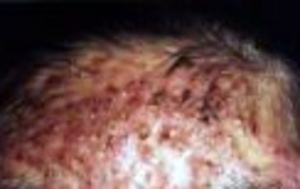Acne is the term for plugged pores that occur primarily on the face, neck, back, shoulders, and chest. While certainly not life threatening, severe nodular acne can lead to serious and permanent scarring, not to mention the emotional and psychological effects.
Acne comes in many forms, from a small red dot to large, pus-filled cysts or nodules. These forms may be interrelated, meaning developing from one form to another, or they may be completely independent.
Acne of every form occurs when male hormones (found in both males and females) increase and stimulate and enlarge the oil glands in the skin. (This is not the same as a hormonal imbalance.) These sebaceous (oil) glands are located in the body where acne is most likely to develop and are connected to hair follicles. The sebaceous glands make an oily substance called sebum, which comes to the skin surface through the follicle opening (pore). The sebum causes the cells from the follicle lining to shed rapidly, stick together, and plug the pore. Bacteria then grows at the site, which stimulates inflammation and causes the follicle wall to break. The sebum, bacteria, and cells move into the skin and cause redness, swelling and a pimple.
Severe nodular acne occurs when the blockages of the oil glands burst open and produce inflammation and pus in the surrounding tissue. These acne cysts are infections that are usually deep under the skin and don’t rise to the surface. Severe nodular acne heals extremely slowly because the infection is not discharged through the pore, as it is in most forms of acne.
Severe nodular acne is not only unsightly and therefore hard on the self-esteem and confidence, it’s too often the focus of unkind and tasteless jokes, as well as being physically painful. These lesions also have the potential to produce long-term scarring.
Acne will affect nearly every teenager, to one degree or another. However, people of all ages can have episodes of acne; in most cases, however, the older a person is, the less likely they are to suffer an outbreak.
Most cases of acne can be successfully treated, including severe nodular acne. There are many modern treatment methods, so the chances of permanent scarring are fewer than they were even just a few years ago. The treatment for the more severe forms of acne will require a dermatologist, who can recommend or prescribe an individualized course of treatment. For severe nodular acne or cysts, a dermatologist will likely prescribe istretinoin (Accutane), which is an oral drug. It has a decent record of clearing up severe nodular acne, although it normally takes several months for severe acne to disappear.
Accutane works by reducing the size of the sebaceous glands so that less oil is produced, resulting in less bacteria growth. Unfortunately, Accutane also has serious side effects, including depression, psychosis, and on rare occasions it can lead to suicidal ideation and suicide attempts. A dermatologist should take a thorough medical history before prescribing Accutane because it can also cause birth defects. For some, it may be best to use only topical medications.
There are also a few web sites where one can find information on acne and acne treatment options, as well as participate on a message boards. One such site is acne.org.
Regardless of the kind of acne a person suffers from, there is no longer a need to live with acne and all the negative effects. Successful treatment is available.
